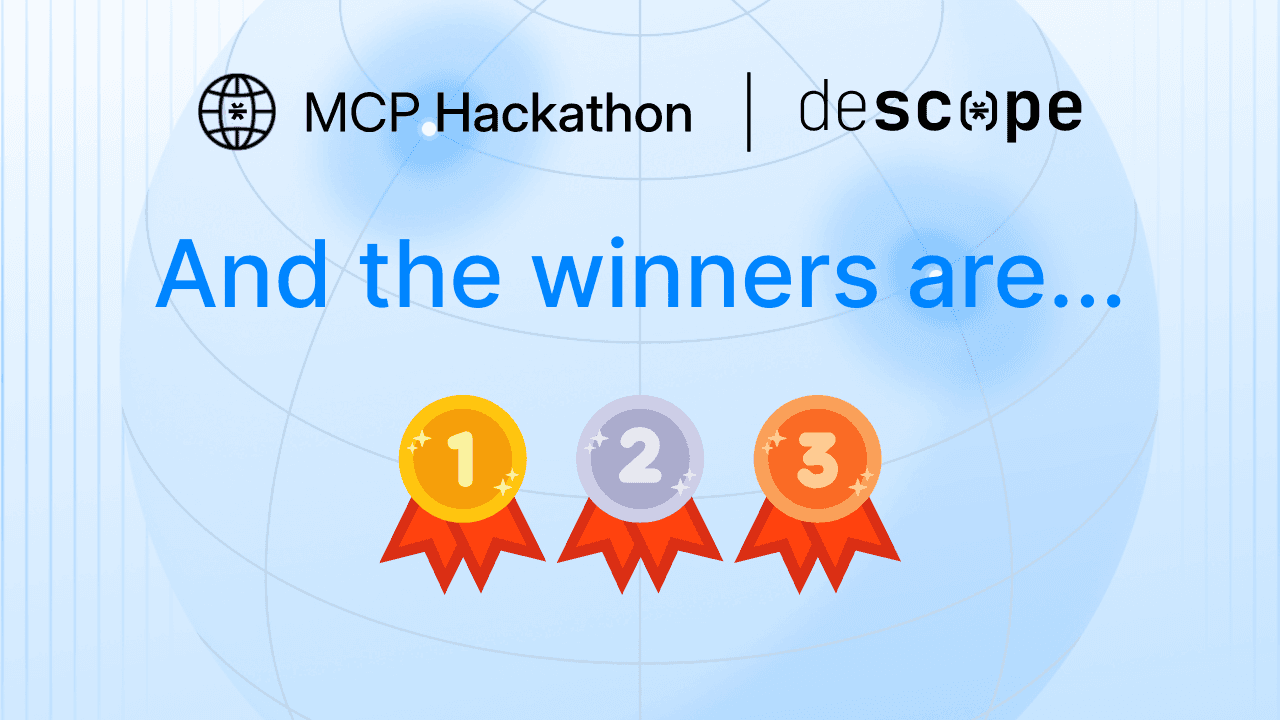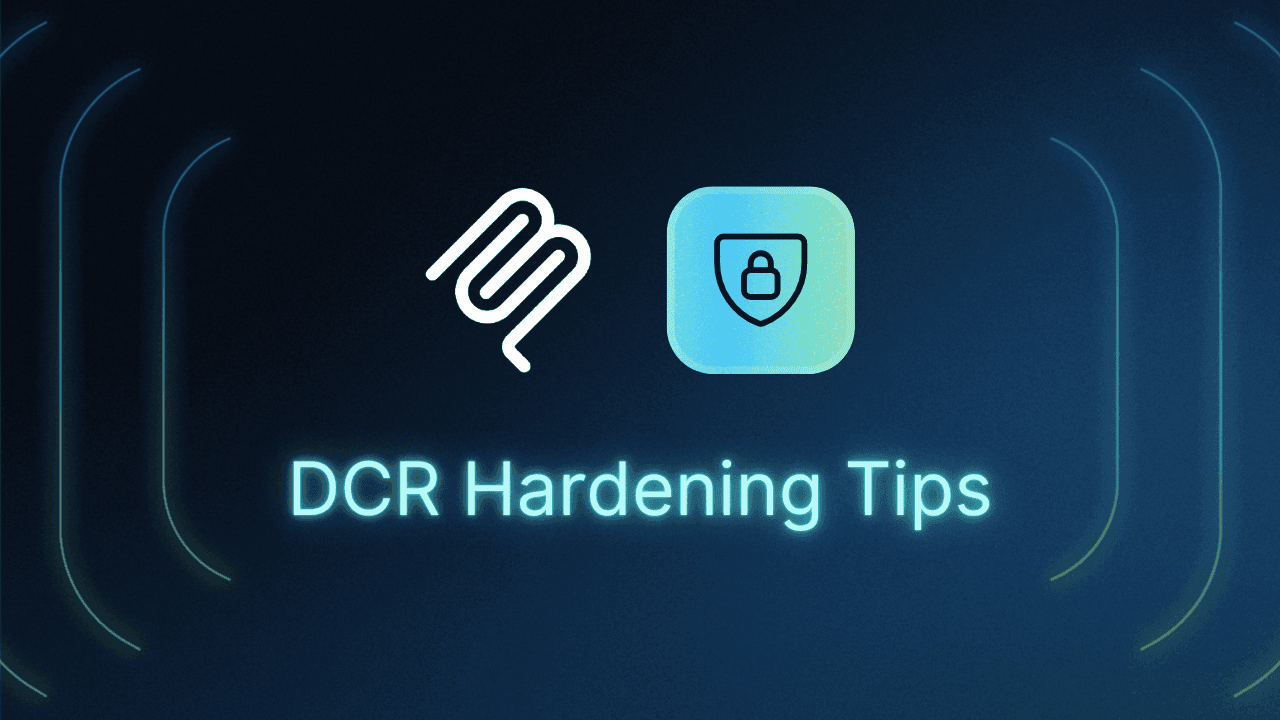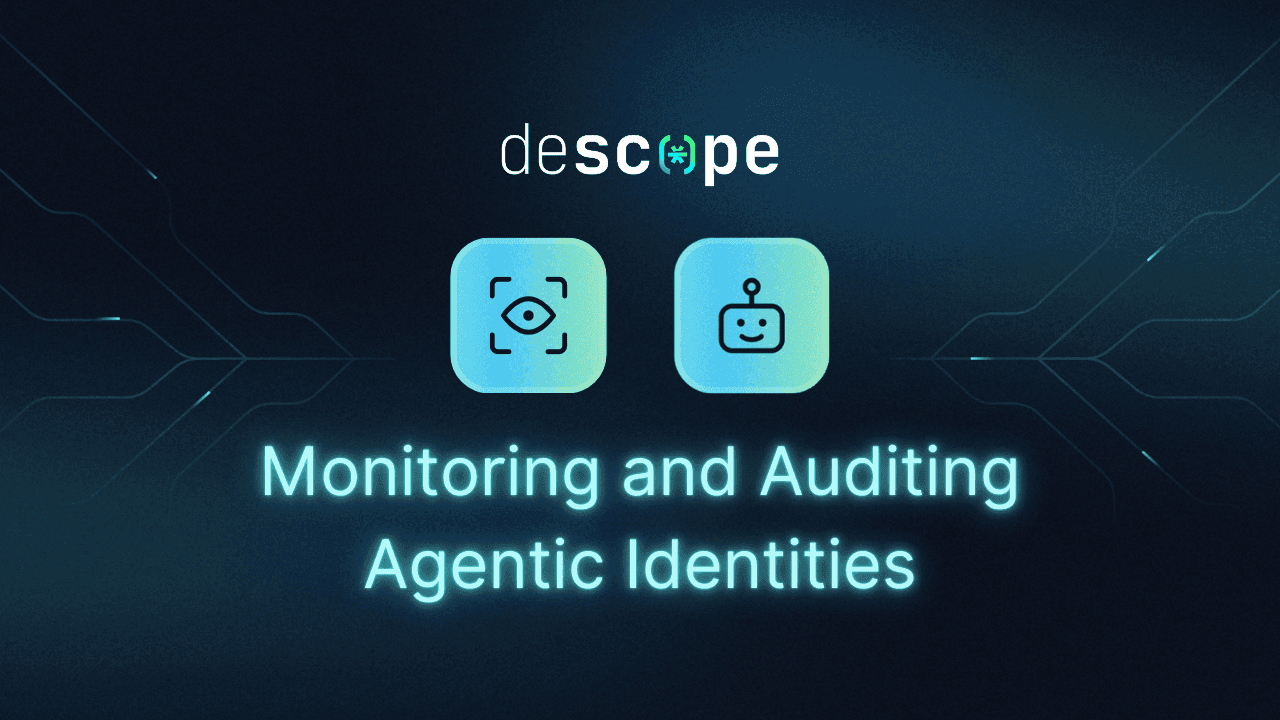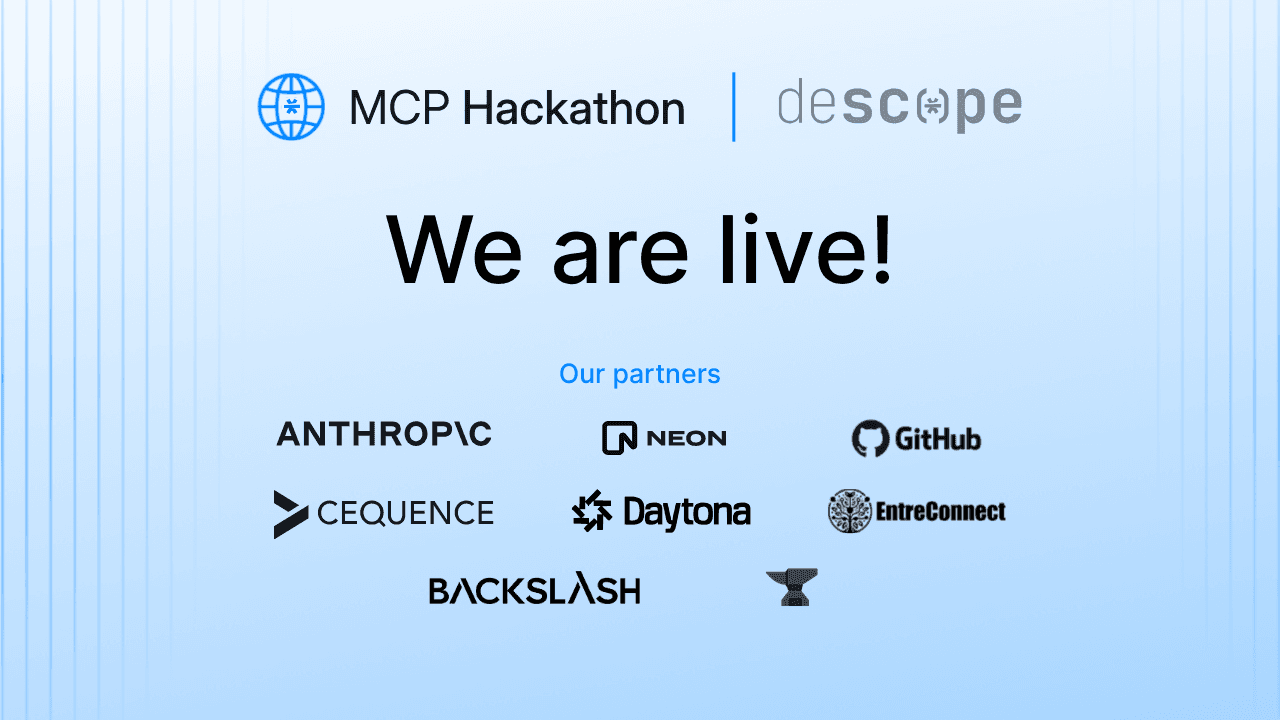Table of Contents
Theme 1: Build a purposeful AI Agent
We’re excited to share the results of the first-ever Descope Global MCP Hackathon! Over the past four weeks, developers from around the world came together to build secure, identity-aware AI agents and MCP servers using modern infrastructure from sponsors like Anthropic, Neon, Cequence, GitHub, Daytona, Backslash Security, Smithery, and EntreConnect.
With $25,000 in cash prizes and $100,000 in developer credits on the line, the submissions pushed the boundaries of how autonomous software can authenticate, delegate, and act securely.
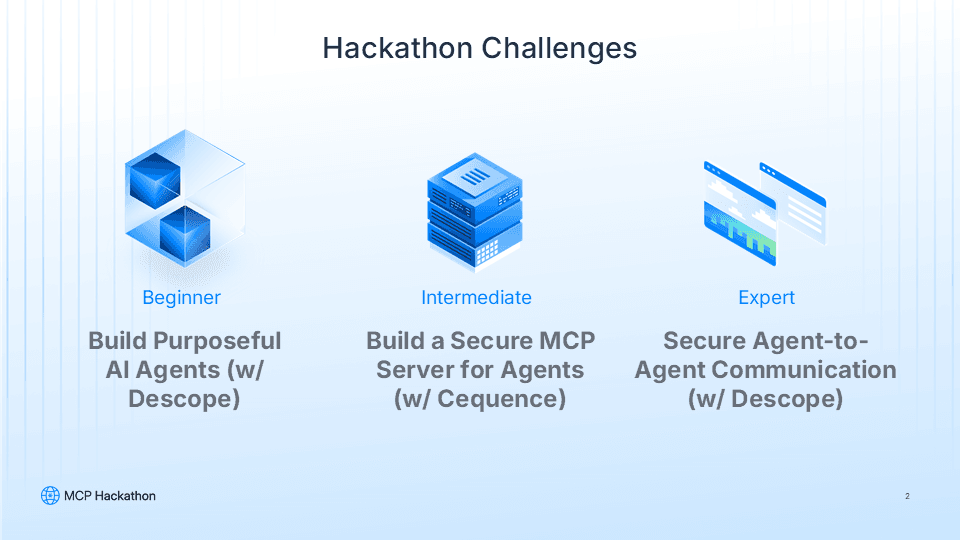
Theme 1: Build a purposeful AI Agent
This challenge invited developers to design AI-powered agents that solve meaningful real-world problems by connecting securely to third-party platforms. Using Descope Outbound Apps, participants were able to integrate tools like GitHub, Slack, and Google Calendar without hardcoded tokens or custom OAuth logic. The submissions showed just how versatile AI agents can be when paired with strong identity foundations.
1st place: FutureCommit (Team CodeLatte)
Developers often waste hours chasing missing documentation, piecing together incomplete release notes, or trying to coordinate across too many platforms. FutureCommit set out to solve this by building an AI-powered productivity platform that takes the hassle out of onboarding, documentation, and communication. The result is a single place where teams can stay organized, ship faster, and learn together without the usual friction.
How it works
FutureCommit uses Descope authentication and LangGraph pipelines to securely analyze repositories, automatically generating README files, structured onboarding docs, and consistent release notes. From there, it shares updates across Slack, Google Drive, and LinkedIn, while curating relevant YouTube playlists and learning resources to help developers ramp up on new tech stacks quickly.
Why it won
Team CodeLatte delivered a solution that solved a real and familiar pain point for developers: messy collaboration. Their project blended practical AI automation with seamless Descope-powered authentication, showing both creativity and immediate real-world value. FutureCommit demonstrated they could make day-to-day developer work not just faster, but more enjoyable.
While FutureCommit took the top spot for tackling developer collaboration, other teams also impressed with creative applications of AI agents. The second and third place projects showed how these tools can transform everyday tasks like planning trips or maintaining mental wellbeing.
2nd place: Travel AI Planner (Team Venture Vulture)
Planning a trip is usually stressful and time-consuming. Travelers juggle countless blogs, reviews, and notes only to end up with scattered details and confusing costs. Travel AI Planner set out to make the entire process easier by giving users a single place to generate personalized itineraries and keep their trips organized.
How it works
Users simply enter their destination, travel dates, and preferences, and the AI instantly creates a complete day-by-day itinerary. The plan can be saved directly to Google Calendar through Descope Outbound Apps with one click, where each day’s activities appear as individual events. Real-time currency conversions and a secure Descope-managed login keep the experience seamless and safe.
3rd place: Guardian of Mental Wellbeing (Team MindRakshak)
College students often struggle to balance academics with self-care, leading to stress and burnout. Guardian of Mental Wellbeing was designed to help by introducing an AI-powered assistant that ensures students stay focused while maintaining healthier routines.
How it works
After connecting Gmail and Google Calendar through Descope Outbound Apps, the AI agent automatically schedules wellness breaks, focus sessions, and reminders. It operates in the background to prevent overload, while also letting students interact in real time to request adjustments or receive wellness suggestions.
Theme 2: Deploy a secure MCP server
For this challenge, teams transformed existing apps and APIs into agent-accessible MCP servers, secured by the Cequence AI Gateway. The goal was to expose tools that agents could call safely and reliably while managing authentication and permissions through Descope. Submissions pushed the limits of what MCP servers can do, from simplifying everyday workflows to orchestrating complex systems.
1st place: Sheeter (Team sarthak647_7427)
Working with Google Sheets in AI workflows is often harder than it should be. Developers have to wrestle with complex Google Cloud setup, service accounts, and authentication flows just to get basic access. Sheeter set out to simplify this process by turning Google Sheets into secure, ready-to-use APIs in minutes. The result is a tool that removes barriers and makes spreadsheets instantly useful for AI-driven applications.
How it works
Sheeter is hosted on the Cequence AI Gateway and uses OAuth-based authentication to expose full CRUD operations for spreadsheets. With native MCP protocol support, AI agents like Claude can read, write, and manage sheets through natural language. What once required half an hour of configuration now takes just a few seconds, making everyday workflows like calorie tracking, expense management, or project planning seamless.
Why it won
Team sarthak647_7427 showed how a simple but powerful idea could transform developer productivity. By removing the setup headaches and letting any spreadsheet become an API, they demonstrated the promise of MCP servers in a clear, accessible way. The practicality, clarity, and speed of implementation made Sheeter both elegant and impactful.
Sheeter showcased just how simple and powerful MCP servers can be, but the innovation didn’t stop there. The runner-up teams also impressed by applying multi-agent orchestration to software development and reimagining healthcare workflows with secure, AI-driven dashboards.
2nd place: Multi_Orchestrator_MCP (Team UpsideDown)
As AI agents move from prototypes to production, the risk of generating insecure or unreliable code becomes a major challenge. Multi_Orchestrator_MCP, also called the Autonomous Software Foundry, set out to address this by building an enterprise-grade MCP server that functions as a virtual AI engineering team.
How it works
The system uses multiple specialized agents for architecture, coding, and quality assurance, all coordinated by an orchestrator. A self-healing feedback loop tests generated code, finds bugs, and deploys other agents to fix them. Descope manages agent identities and permissions, while the Cequence AI Gateway enforces Zero Trust security and auditability across the process.
3rd place: Healthcare Assistant Dashboard (Team AI-tron)
Healthcare providers face inefficiencies when juggling fragmented systems for patient data, scheduling, and verification. The Healthcare Assistant Dashboard was created to unify these workflows in a HIPAA-compliant, AI-driven platform.
How it works
Built with Next.js and powered by Descope authentication, Cequence API protection, and Neon’s secure database, the dashboard exposes healthcare functions as MCP tools. Agents can securely invoke workflows like appointment scheduling, drug interaction checks, and insurance verification through natural language, all while ensuring patient data is protected and accessible only to authorized users.
Theme 3: Design secure agent-to-agent systems
This advanced challenge asked participants to imagine how AI agents could talk, trust, and collaborate across strict boundaries of identity and access. Developers used Descope Inbound Apps to enforce scoped permissions, delegated consent, and secure inter-agent communication. The projects demonstrated just how powerful multi-agent ecosystems can become when designed with security at the core. We were especially excited to see how the winners applied these principles to fitness, enterprise security, and digital identity.
1st place: AI Fitness Agent (Team Confickers)
Sticking to a fitness routine can be difficult, especially for beginners, older adults, or people managing health conditions. Choosing the right exercises, meals, and recovery methods is often confusing, and most tools don’t personalize guidance in a meaningful way. AI Fitness Agent set out to solve this by creating a system of specialized agents that work together to provide tailored fitness, nutrition, and recovery support.
How it works
Users log in once through a Descope-secured flow, and from there scoped JWT tokens govern every interaction between agents. A FastAPI orchestrator routes user queries to the right agent—Trainer, Nutrition, or Recovery—and aggregates their responses. The system can even integrate Fitbit data to provide recovery insights, making the guidance both personalized and dynamic.
Why it won
Team Confickers applied advanced multi-agent security principles to a use case that resonates with nearly everyone. Their project showed how scoped permissions and delegated access can be turned into something relatable and impactful: better health guidance. The team balanced strong technical execution with a clear path to real-world adoption.
AI Fitness Agent demonstrated the power of secure, delegated access in personal health, yet the track also featured standout entries that explored critical enterprise and identity challenges. The second and third place winners showed how multi-agent systems can strengthen trust in security operations and digital identity verification.
2nd place: Z3r0Trust (Team Sentinel 5)
Enterprises are flooded with identity-related threats such as credential theft and brute-force attacks, often hidden within noisy SIEM alerts. Z3r0Trust was designed as a multi-agent system that can detect, analyze, and respond to these threats in real time without disrupting legitimate users.
How it works
Each agent gets their own token issued by Descope that is specific to that agent and their client ID. Splunk alerts are ingested and handled by a network of specialized agents that log activity, notify users, and take corrective actions such as suspending accounts, enforcing MFA, or blocking malicious access.
3rd place: KMKM (Know-Me-Know-Me) (Team dsiddharth25_9610)
The internet faces a growing problem with fake accounts, but most verification methods require users to overshare sensitive personal data. KMKM offers a privacy-preserving alternative by issuing a reusable digital ID that proves uniqueness without revealing unnecessary information.
How it works
A decentralized network of AI agents verifies user documents through OCR and cross-validation with Google Gemini. Descope Inbound Apps and our OAuth tokens protect all agent-to-agent communication, and once verification is complete, the system issues a permanent KMKM ID that platforms can use to confirm authenticity without storing sensitive records.
Thanks to judges and sponsors
We want to extend our thanks to our guest judges who dedicated their time and expertise to evaluating the submissions. Their thoughtful reviews and feedback ensured that the most impactful projects rose to the top. Special thanks to Abhishek Chhibber, Hemanth HM, Lohitaksh Yogi, Ryan Sudhakaran, Den Delimarsky, Thorsten Schaeff, Ido Pesok, Shreyans Mehta, and Darshan Sonde for helping make this hackathon a success.
Also, a huge thank you to our sponsors for providing the tools, credits, and community support that made this hackathon possible: Anthropic, GitHub, Cequence Security, Neon, Daytona, Backslash Security, Smithery, and EntreConnect.
Your support helped developers bring these projects to life.
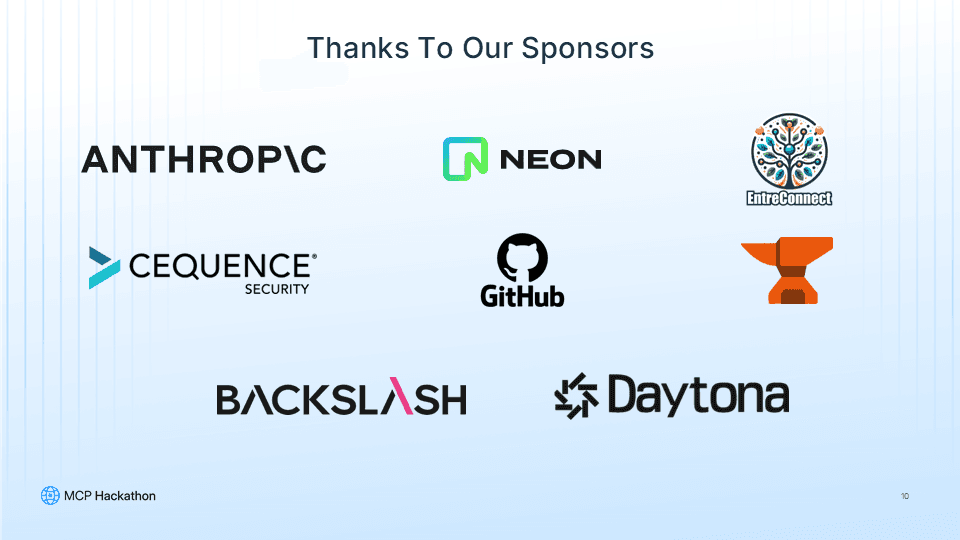
What’s next?
The Global MCP Hackathon may be over, but The MCP ecosystem is just getting started. We’re excited to keep building it with you.
Want to learn more about how to build with MCP and Descope? Check out our docs or join our Developer Community. If you'd like a demo, meet with our auth experts. Also, if you want to try Descope yourself, sign up for a Free Forever Account.

